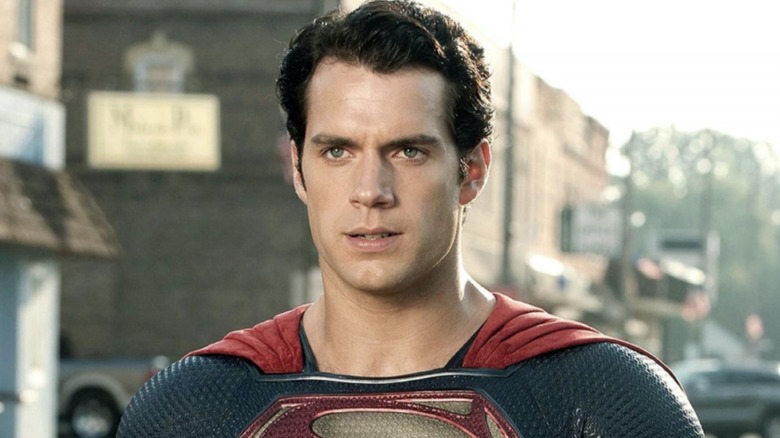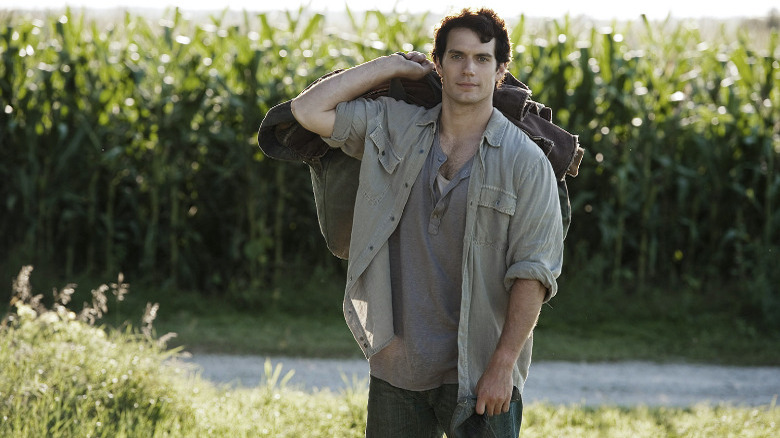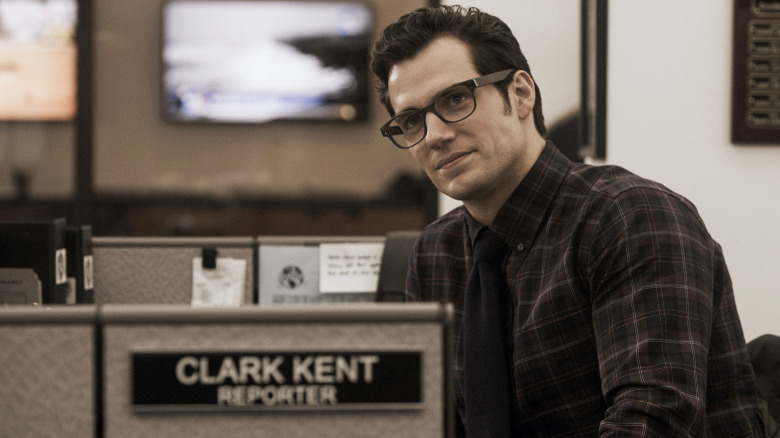An Ode To Henry Cavill, A Great Superman Who Never Got A Great Superman Movie
The first two roles I knew Henry Cavill for couldn't have been more different from one another. In Matthew Vaughn's 2007 fantasy film "Stardust," he plays Humphrey, an uppity romantic rival for Charlie Cox's heroic Tristan with a marvelously unconvincing mop of blonde hair and a dweeby pencil mustache. That same year, Cavill co-starred in Showtime's TV series "The Tudors" as the young King Henry VIII's (Jonathan Rhys Meyers) best friend Charles Brandon, 1st Duke of Suffolk, a dashing fellow who has little trouble sweeping Henry's widowed sister off her feet.
That Cavill handled both roles with equal aplomb should have been my first clue to expect big things from him, well before he was cast as Superman in 2011. His tenure as the Man of Steel would not be an easy one, however, beset by behind-the-scenes issues and Zack Snyder's polarizing creative vision for DC's finest characters. Cavill, to his credit, never wavered through all the noise and chaos. He embraced the role of Kal-El both onscreen and offscreen, politely interacting with fans on social media and doing his best to give thoughtful answers when asked about the negative reactions to the so-called Snyder-verse.
As such, Cavill's cameo as Superman in the "Black Adam" credits scene and subsequent confirmation of his return to the role in a future film (or films) was exciting news. At last, the actor would get a chance to play the Last Son of Krypton the way he had always wanted — as a beacon of hope and inspiration for the people of Earth. Alas, with the DC Extended Universe now under new leadership and being heavily restructured (if not outright rebooted), Cavill's return as the Man of Steel has ended before it could even begin.
Let's take a moment to salute him, shall we?
An ideal to strive towards
Zack Snyder's "Man of Steel" is perhaps emblematic of all that was both good and not-so-good about Henry Cavill's time playing Superman. It's thanks to Cavill that the 2013 film, in many ways, succeeds at bringing Kal-El down to Earth. You believe the young Clark Kent wants to lead by example and make the world a better place, yet is torn over how to properly do that. But it's not just his anguish and inner conflict; Cavill does an equally stellar job selling the character's rare moments of joy and bliss, none more so than when he defies gravity for the first time.
There's a great Superman film rattling around inside "Man of Steel," as /Film's own Chris Evangelista has written about in the past. The problem is, like so much of Snyder's work, the movie is often at odds with itself. Shots of Superman inadvertently blowing up trains and leveling skyscrapers in his climactic battle with General Zod and his minions are presented as awe-inspiring rather than tragic and terrifying. They also clash with the film's quieter, more ruminative scenes where Clark struggles to figure out the best way to use his superpowers.
While nuance might not be Snyder's strong suit as a filmmaker, it's something Cavill knows how to express all too well. Given how relentlessly dour "Man of Steel" tends to be, it's easy to forget just how much modest charm Cavill brings to Kal-El, like when he allows the U.S. military to capture him or when he flirts with Lois Lane (Amy Adams). Its more dubious narrative choices aside, the film ultimately works as an origin story for a modern Superman because of this. Cavill, if you will, gave the Snyder-verse "an ideal to strive towards," to quote Jor-El (Russell Crowe).
Superman was never real (but Cavill was)
Sadly, neither the theatrical cuts nor Zack Snyder's extended editions of 2016's "Batman v Superman: Dawn of Justice" and 2017's "Justice League" were able to satisfyingly build upon the foundation laid by "Man of Steel." They have the same issues as their predecessor only magnified; thanks to their excessive bleakness and misguided tonal shifts, these movies come off feeling more bombastic and edgelord-y than majestic and mature. Yet, through all the din and darkness, Cavill continues to shine as Kal-El, making the most of his scenes even as the character is increasingly sidelined.
Take "Batman v Superman." Of all the scenes in the film where people are either being brutally murdered or simply brutalized, the ones with the most emotional resonance are those where Clark Kent reflects on the state of the world. His bathroom chat with Lois after the tragic events in Nairomi is vulnerable and intimate in more ways than one (turns out, superheroes can be horny), while his gentle, understated "Superman was never real" confession is more impactful than any amount of destruction the movie throws at the screen. The same could be said for the scenes in "Zack Snyder's Justice League" where our beloved red-and-blue boy scout, newly returned from the dead, slowly regains his memories upon visiting the old Kent farm with Lois.
It's during these exchanges that Cavill not only proves his mettle as a great Superman actor but also hints at what he might've been able to accomplish under the guidance of a different head creative. Much like we appreciate Christopher Reeve for excelling as the Man of Steel while also making our peace with the ways his later outings as the character fell short, there's no good reason we can't extend Cavill a similar courtesy.


